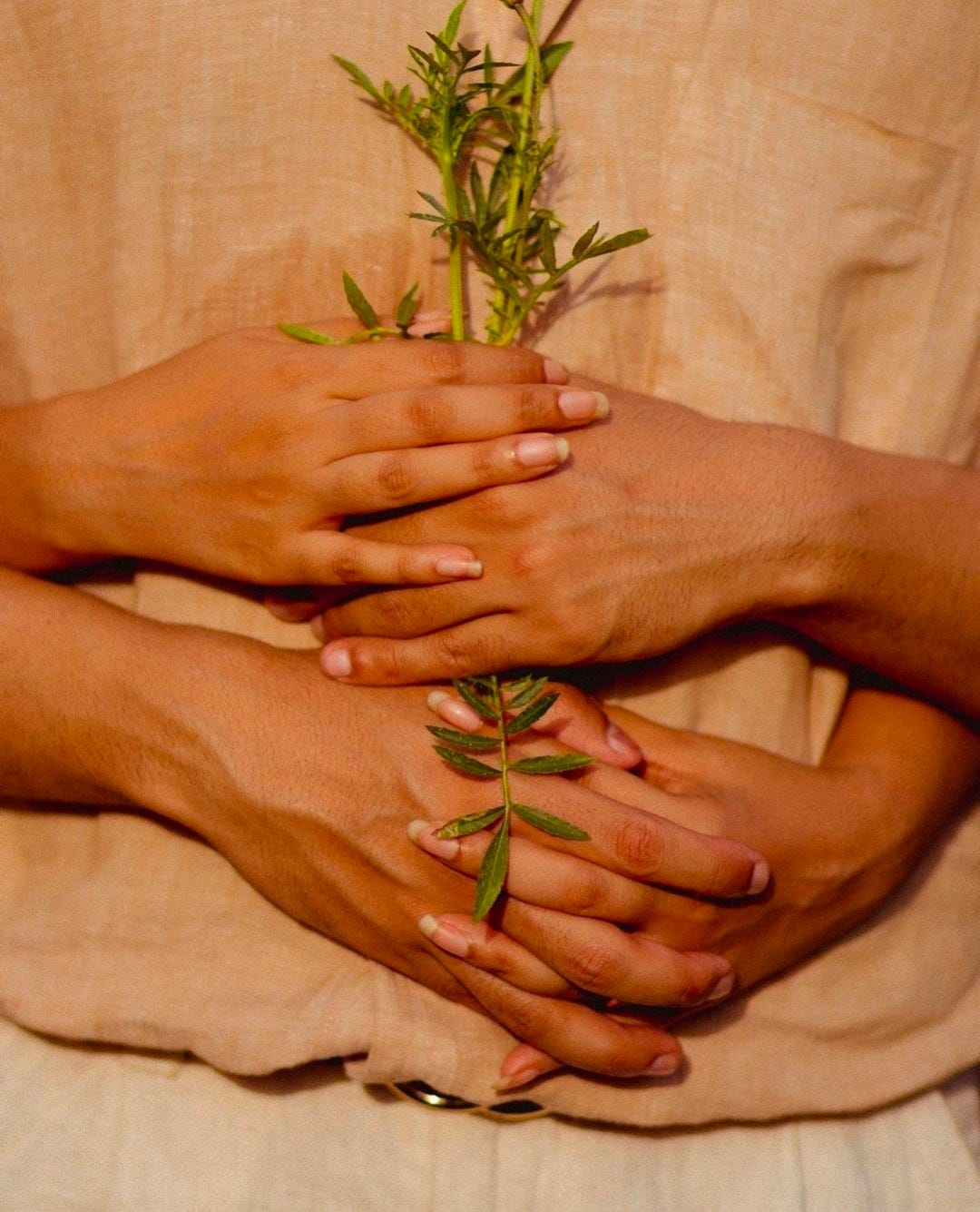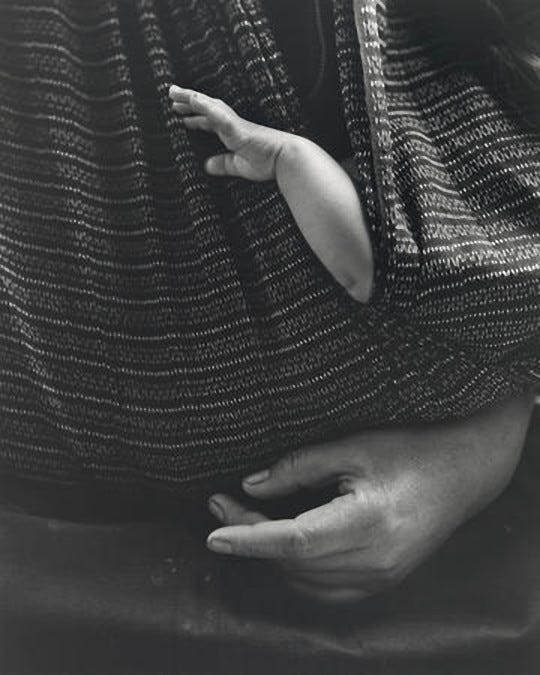a guide toward Touch.
the task of our hands is the task of an ongoing proclamation of sanctity.
dear little voice,
here is how to touch another person:
as though you are picking up a ripe clementine from the ground
as though their skin were to begin the first flower in your hand
as though to another palm in prayer—
as though violets— by your side— as though a robin— very near—
as though with the softness of wild leaves falling to the earth
as though holding your hand out with arched stillness for a roving butterfly
as though yours are fingers of silence curled quietly upon a wish
as though before you lies both your waters and your watering place.
as though you have hands. because you have hands. because you have those hands in your hands. as though becoming those other hands as those other hands are becoming you. as though between two mirrors.
as though grasping a single tear; salt, soft, warm as shells, its bright body a charm; a spell.
as though your hands are a whispering, writing murmur heard through skin, which resounds in the cavern of the chest, alongside the Heart, climbing up the throat and emerging a bird.
as though reminding.
“Just the tip of your finger touches me / and I bloom”
rules are not always important, little voice, but these are. this is because, in touch, you take the responsibility of having hands.
and hands are precious things: a Touch can undress a Heart down to the sheath of its nerves, remove its jacket and place it over the nightstand, unhook its shirt, spread its breath flat on a chair, speak to it without stirring the air and, then, take it and place it at the feet of someone who lost it a very long time ago.
as poet Wendell Berry wrote: “there are no unsacred places / there are only sacred places / and desecrated places.”
the task of our hands is the task of an ongoing proclamation of sanctity.
a Touch is not a singular thing. it does not last one moment, or two, or three- regardless of its Time spent in togetherness. a hand remains on the body it has touched long after it departs its skin.
this is because Touch does not obey the orderly mechanics of the world. among physicists, this is a notion referred to as quantum entanglement, or, the inability to describe two objects independently after they have interacted.
information cannot travel faster than the speed of light, little voice. but, in a 1935 paper, Albert Einstein and his co-authors showed how entanglement leads to what is now called quantum nonlocality: or, the strange link that appears to exist between entangled particles. if two objects in space and time meet and then separate, even across a distance of thousands of lightyears, it becomes impossible to measure the features of one system (such as its position, momentum and polarity) without instantly steering the other into a corresponding state.
quantum entanglement: your hand has acted upon another’s at some moment. therefore, the particles in your hands are entangled now and forever: in togetherness, and in distance.
and, now: if their hands- so far- are at some beautiful, distant work, you too are now at that work: the tiny gesture of their parting wave; the clandestine squeeze of their hand by a fleeting lover, the stooped arch of their wrist to collect a stranger’s dropped grocery list, the fingers that braid hair with such grace over the television’s thrum, the palms that bare such perfect witness to prayer, the hands that confuse this, wonderfully, with the acts of the body, the fingers’ perfect, lucid, bleary-eyed grasp of a flower in early morning, the enormous attention of pointing to draw attention to the Sky, the grasp of the tree’s first apricot for a child— you act the hand of the entangled other.
let the scientists call this quantum entanglement. let us call it responsibility.
Octavio Paz, ‘Wind From All Compass Points’, A Tale of Two Gardens
the artist Georgia O’Keefe called lover Alfred Stiegletz: my hand.
— good morning, my hand. good evening, my hand. i kiss you, my hand. i long for you, my hand. i touch you, my hand, my hand, my hand, your hand, my hand, two palms held together in prayer: a touch. —
Georgia O’Keeffe’s hands, photographer by her lover and photographer Alfred Stiegletz
“Without touch, God is a monologue.”
- Andre Dubus, from “On Charon’s Wharf”, Broken Vessels: Essays
between two lovers- of any variety- two spoken languages meet as hands touch: as skin. as we press our language to the other in speech, it is as though we have words instead of fingers, or fingers at the tips of our words. in touch, our languages tremble. we come to realise that this language is the only contact we can make- and yet, skin is the only object also separating us from the Other: it stands between, as both pathway and partition; as both wall and as door.
it is the separateness of these two languages that beckons a third: our Words, that are so often so beautiful and clear and right, are so often also strange, and sore, and compromising and inarticulate, innacurate and helpless, need, on occasion, to be spoken for by the Unspoken. it is here that the Hand, although also limited by cartilage and bone, enters and gives life where the tongue may falter.
two langauges touching, unknown.
this is unsurprising, little voice. your first language, after all, was touch.
there was nothing primitive about this leixcon of gesture, and nothing that we say now that could not be said in the endless fluttering of wrists and palms; of the fine bones of the fingers and the soft flex of the thumb. it was.
these gestures were complex and subtle. they involved a delicacy of motion and deliberate intention that has since, perhaps, been lost.
this is especially the case when the mouth means to say I’m sorry or I love you or I don’t know.
as the touching poet Nicole Krauss writes in The History of Love:
“In this ancient language, no distinction was made between the gestures of language and the gestures of life. The labor of building a house, say, or preparing a meal was no less an expression than making the sign for I love you or I feel serious. When a hand was used to shield one’s face when frightened by a loud noise something was being said, and when fingers were used to pick up what someone else had dropped something was being said; and even when the hands were at rest, that, too, was saying something. Naturally, there were misunderstandings. There were times when a finger might have been lifted to scratch a nose, and if casual eye contact was made with one’s lover just then, the lover might accidentally take it to be the gesture, not at all dissimilar, for Now I realize I was wrong to love you. These mistakes were heartbreaking. And yet, because people knew how easily they could happen, because they didn’t go round with the illusion that they understood perfectly the things other people said, they were used to interrupting each other to ask if they’d understood correctly. Sometimes these misunderstandings were even desirable, since they gave people a reason to say, Forgive me, I was only scratching my nose. Of course I know I’ve always been right to love you. Because of the frequency of these mistakes, over time the gesture for asking forgiveness evolved into the simplest form. Just to open your palm was to say: Forgive me."
“Each flower began /
in the palm of a hand, /
each petal /
in origin /
a gesture an action /
a touching.”
the seemingly unnecessary gestures of our hands as we speak has since lingered; as though our bodies know more than we do that all speech is a movement toward touch. clapping, waving, pointing… these are all artefacts of an ancient language, little voice.
even holding hands can feel like an attempt at needing no language at all. and at night, when the rain is speaking with the tin roof, and it is cold, and we feel something turn over in our chests, and nothing seems right at all, we even find it necessary to gesture on one another’s bodies to make ourselves feel understood.
Jerome Liebling (1924-2011) | Mother, Baby’s Hand, Mexico, 1974
your hands carry a profound responsibility, little voice. what You touch, you exist within. your Touch will move, entangled, beyond you: it will go out with lanterns, searching. your touch will be forever inherited by what it touches; and by each that is touched after it.
quantum entanglement: your hand has acted upon another’s at some moment. therefore, the particles in your hands are entangled now and forever.
each touch echoes the other.
this is your responsibility.
you may call it what you like.
love,
ars poetica.













Like Peter Gabriel once exclaimed, "I have the touch". John Lennon also opined "Love is real, love is touch".
a few of my family members do not approve of affectionate gestures like embracing in hugs or the occasional shoulder tap. i feel like i am the one who is awkward now. Bodies are meant to be celebrated. i live with people who do not respond positivity to my curious nature of Touch.
her death
a year ago this month
and the small white room
reserved—
its barrenness, isolation
beyond the pulse
of IVs, monitors, struggle—
except for me
suddenly alone
wanting to leave
wanting to touch.